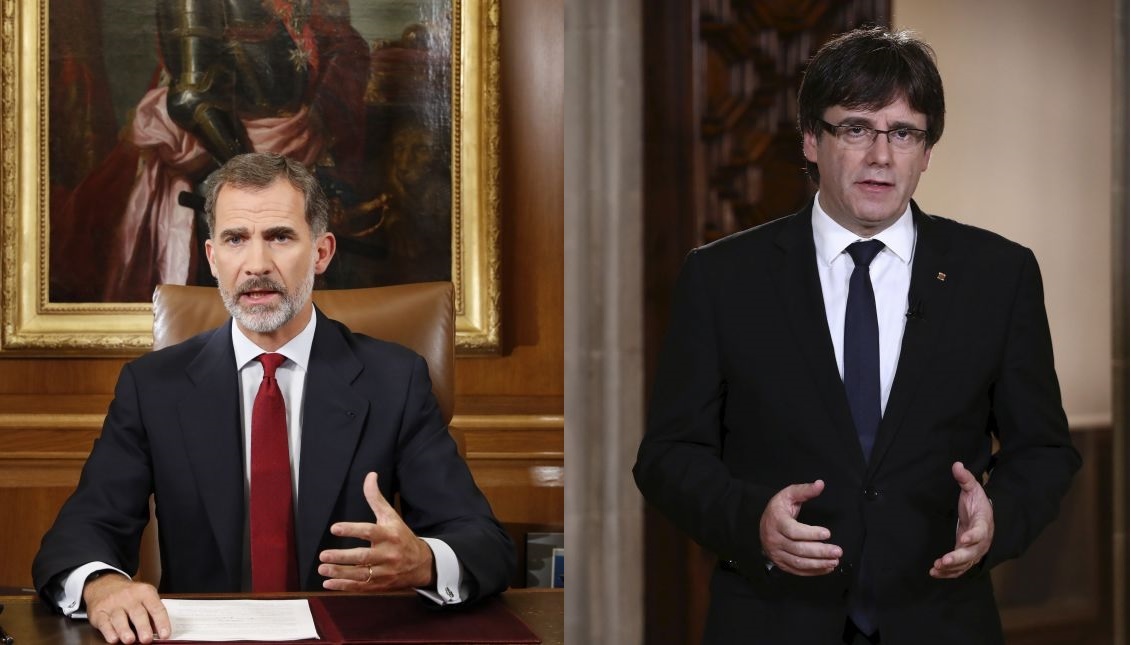
"Spanish king disappointed many citizens in Catalonia," Catalan President says.
Catalan leader Carles Puigdemont accused the King of Spain of endorsing the “catastrophic” policies of Prime Minister Mariano Rajoy instead of offering…
He waited exactly 24 hours to put the King of Spain in check.
Carles Puigdemont, president of the separatist government of Catalonia (a region in northeastern Spain, whose capital is Barcelona) said Wedenesday that King Felipe VI's decision to not to condemn the brutality used by the Spanish police to try to stop an independence referendum last Sunday has disappointed many Catalan citizens that admire him and have always supported him.
In his address to the nation Tuesday night, the king aligned with the Spanish central government, led by conservative Mariano Rajoy, and condemned the Catalan government for calling an illegal referendum and daring to defy the Constitution and the Democratic institutions of Spain. The king also accused the Catalan government of creating social division in Catalonia and putting the socioeconomic stability at risk.
Mr. Puigdemont was right in his words when saying that the King speech disappointed many Catalan citizens, who expected from him to encourage dialogue with the central government and to condemn the violent intervention of the Spanish police to stop the referendum, which left more than 700 injured behind, according to the Catalan government. The brutality of the Spanish national police and the Guardia Civil (another force of order with no competence in Catalonia, which has its own police, the "Mossos") sparked manifestations and protests across Catalonia on the following days of the referendum. The images of violence at electoral school made the cover pages of several international media, but the chief of the Guardia Civil accuses this images of being "fake". This reporter witnessed herself many people who suffered the violence of the police, who broke into electoral schools dressed in anti-riot equipment, rubber bullet riffles, truncheons included) while citizens - a lot of them old people - were offering pacific resistance.
One week before the illegal referendum, Rajoy's goverment ordered the deployment of thousands of Spanish police and Guardia Civil to Catalonia. They were instructed to confiscate ballot box, ballots and electoral propaganda of the referndum. On the day of the referendum itself, Spain General Attorney ordered the police to evict and close all school polls, so citizens started to "occupy" the schools during the days before to avoid the schools being closed.
Puigdemont, thus, faulted the monarch for making no mention of Catalans who were "victims of police violence that has chilled the hearts of half the world."
According to preliminary results, the illegal referendum got 42% participation, and "yes" won by 90%. A month ago, the Catalan parliament approved a very disputed law that says that 48 hours after the official results of the referendum are announced, it will declare independence unilaterally.
RELATED CONTENT
However, Puigdemont hasn't announced the official results of the referendum yet, calming the anxiety of many Catalan citizens that think a unilateral declaration of independence - with total lack of legimity and international recognition, would be suicidial. Also, the results of the referendum are far of being reliable, as many ballots were confiscated by the police and the conditions of vote were very irregular (the Spanish government cyberattacked the votation electronic system).
In his televised speech on Wednesday, Puigdemont insisted that the Catalan goverment is now appealing for a "process of mediation" to resolve the conflict and said that the government of Spanish Prime Minister Mariano Rajoy was acting irresponsibly in rejecting offers from would-be mediators.
"This moment calls for mediation," the Catalan leader said. Puigdemont mentioned that he has on the table offers from mediators from Spain and abroad.
Hours before Puigdemont's speech, the leader of Spain's leftist Podemos party, Pablo Iglesias, urged Rajoy to enter talks with Catalonia.
The prime minister rejected the proposition, arguing that Madrid won't negotiate with a government that blackmails them. According to public Catalan radio, Catalunya Radio, Rajoy's government won't accept to talk to the Catalan separatists unless they explicitly abandon the idea of issuing a unilateral declaration of independence.
Rajoy told Iglesias that the issue of the independence proclamation was "non-negotiable," according to sources quoted by EFE.
The Catalan parliament is scheduled to take up the independence question next Monday.











LEAVE A COMMENT:
Join the discussion! Leave a comment.